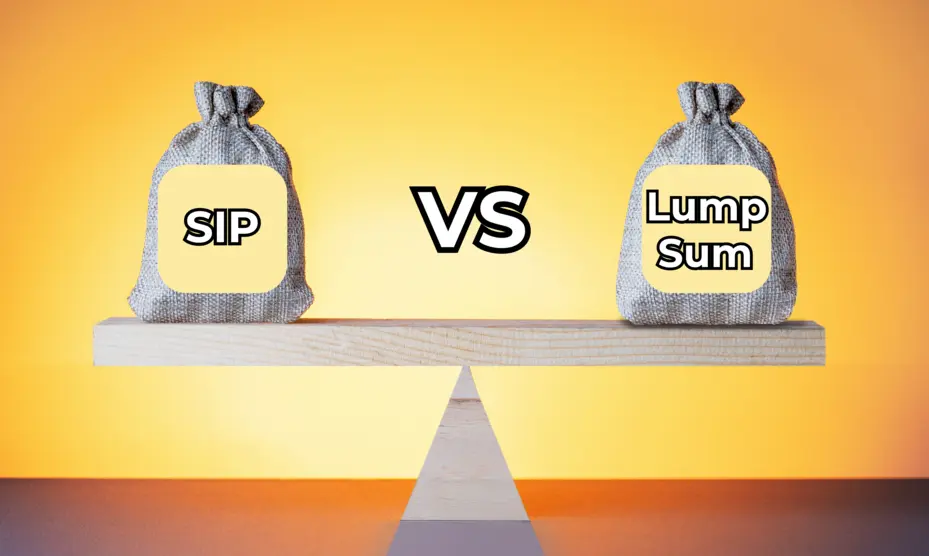
Difference Between Lumpsum Investment and SIP
As an investor eager to start investing in mutual funds in India, you have two options. You may have heard about SIP (Systematic Investment Plan) investment, but have you heard about lump sum investments? Unfortunately, these two options often cause dilemmas among investors. Some experienced investors have encountered these two terms when taking a course in trading.
This blog will let you know what route you want to take to mutual fund investing.
What is a Lump Sum Investment?
As the name suggests, you make a single payment, which usually is a significant amount. The payment doesn't happen regularly like other gradual investments.
A lump sum investment is fit for individuals with memory issues who want to finish their investment commitments! It is a productive option in bullish markets, which will rise later.
Choosing the best lumpsum mutual funds requires analysing past performance, the manager's experience, and the market scenario.
What is SIP Investment?
At one time or another, every investor wondered what SIP is and how it works. Many resources exist to read about these new and improved investment options.
It involves investing similar or the same amounts in deposits throughout the year. This planned approach suits people who don't have the excess amounts for a one-time deposit.
Funds that are consistent performers make good sip investment options. SIPs work on evening out costs over time by buying more when prices are low and less when prices are high.
Major Differences Between SIP and Lumpsum Investments
We'll show you how much they vary based on a few points that help you determine which is better SIP or lump sum.
| Feature | Lump Sum Investing | Systematic Investment Plan (SIP) |
|---|---|---|
| Frequency of Investing | One-time only | At regular intervals |
| Timing the Market | It is critical to assess and time the market | Cost averaging reduces the need to time market perfectly |
| Risks | investing lump sum in mutual fund involves greater risks | Lower risks in sip versus lump sum investing |
| Ideal For | People with large amounts, and can commit it upfront | People with regular incomes that are stable and no surplus |
| Expected Returns | Higher returns and faster than SIPs | Moderate yet steady returns over a longer period of time |
| Degree of Flexibility | Flexibility is low after investment | Throughout the investment, there is flexibility |

Advantages and Disadvantages of Lumpsum Investment
Advantages:
- • A swift transfer can complete your lump sum investment for the year or indefinitely!
- • Reduced fee amounts as it involves one transaction.
- • One of the benefits of lump sum investment in mutual fund options is the ability to capitalize on market situations if you can call them correctly, like Multibagger stocks.
- • Unlike SIPs, lump sum investing doesn't recur several times a year.
Disadvantages:
- • Not everyone has a sizable investment amount doing nothing!
- • Investing and then experiencing a market decline is a true concern.
- • A leading reason why investors stay away is the higher risk.
Do you need a wise and clear voice in your ear to guide you onto the path of bright company, sector, and market options to select for IPO investments? Contact us to benefit from the experience of a trusted equity research analyst.
Advantages and Disadvantages of SIP Investment
Advantages:
- • Using this investing option gives the investor the power of compounding, where money grows, and you can reinvest to grow it again.
- • One of the most desirable benefits of investing in SIP is it starts with low amounts, and everyone can afford it and participate.
- • Most SIP plans are automated, making them easy to manage and seamless.
Disadvantages:
- • One of the disadvantages of SIP investments for investors is losing out on high profits after the market rises or rallies in the opposite direction.
- • Slower returns in SIP vs one-time investment is a possibility one must swallow.
- • Meaningful returns are only collected when you invest in SIPs for an extended time using a worthy amount.
When to Choose Lumpsum Over SIP?
Choosing a lump sum vs SIP plan is ideal when:
- • You have a pool of money without a function.
- • The market is fairing in the right direction and will be on the rise.
- • You're open to high growth potential and potentially the best mutual funds to invest in lumpsum.
When to Choose SIP Over Lumpsum?
Choosing a SIP vs lump sum investment is ideal when:
- • You have a stable job but cannot commit to large amounts.
- • You want to overcome short-term risks through staggered investments.
- • You are looking for an investing scheme that grows and progresses with time.

Factors to Consider Before Investing in Mutual Funds through SIP or Lumpsum
Before deciding which is better, SIP vs lump sum, you must assess them both on the following:
- • Market
- • Risk Tolerance
- • Goals (Long-Term)
- • Available Funds
- • Expert Advice
The market's direction plays a role in deciding which investment method is better. When the market rises, lumpsum investments will be preferable for high returns, but poor growth will see SIPs as the safer option.
The more risk you like, the higher the chance lumpsum options will fit your needs. People who don't want risks can proceed with a higher return SIP.
Investors can follow SIPs for long-term financial goals like child education or home purchase plans. Short-term investing plans see a one-time payment as a wiser selection, and a lump sum calculator gives an estimation of future profits.
People can make a mutual fund one-time investment if they belong to a big and disposable income bracket. Investors who are early in their careers can opt for SIPs to even out their costs and savings.
If receiving one-on-one guidance from a SEBI-registered research analyst, it's best to follow their directions without worry.
Final Words
Mutual funds are indeed a desirable prospect for Indian investors. It's the specific way of investing that gets in the way and creates delays. Using this lump sum vs sip in mutual fund comparison and their pros and cons, you can make a decision.
Are you someone in dire need of wealth management services to help you establish a brighter financial destination? If so, don't wait any longer and connect with us.
FAQs
-
Are sip investments good or bad?
SIP benefits and risks need extra attention. But that doesn't make them questionable decisions. There are better investment options to reach long-term financial milestones, and you get an understanding of where you stand with a SIP Calculator. Depending on market sentiment, returns may roll in slower than expected. -
Which mutual fund is best for Lumpsum?
The best lump sum mutual funds are determined by assessing past performance and looking for consistency and stability. -
How does market volatility impact Lumpsum vs. SIP investments?
Lump Sum investments are more vulnerable to market shifts than SIPs. SIP investments are staggered and can offset the risks as they aren't short-term investments. -
How safe is investing lumpsum in mutual funds?
It won't pose a significant threat if you have timed the market well enough to ensure the market is on the up. Make an effort and learn the SIP benefits and risks to protect your investments. -
Can I invest in both SIP and Lump Sum?
Yes, investing in both helps neutralise the market risks while capitalising on the market. Certain conditions may favour one over the other and this way they alternate to keep your investments on course.


